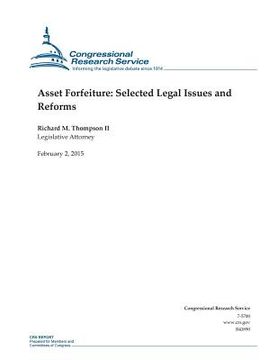Reseña del libro "Asset Forfeiture: Selected Legal Issues and Reforms (en Inglés)"
From its beginning in the First Congress, Congress has viewed asset forfeiture as an integral part of federal crime fighting: It takes contraband off the streets, ensures that "crime doesn't pay," and deprives criminals of their "tools of the trade." In short, asset forfeiture is the process of confiscating money or property from a person because it is illegal to possess, it constitutes proceeds of a crime, or it was used to facilitate a crime. Asset forfeiture became a major tool in combating organized crime, drug trafficking, and other serious federal offenses throughout the mid-to-late 20th century and continues to play a major role in federal prosecutions. In recent years, however, there has been growing opposition to the expanding scope of asset forfeiture, both civil and criminal, with objections primarily coming in two forms: procedural and structural. The procedural objections are based on the idea that the current rules pertaining to asset forfeiture heavily favor the government. With civil asset forfeiture, the property owner need not be convicted nor even prosecuted for a crime before the government can confiscate his or her property. Unlike criminal prosecutions, the property owner is not constitutionally entitled to an attorney or many other safeguards found in the Bill of Rights. The burden of proof is set at the preponderance-of-the-evidence standard, lower than the traditional criminal standard of beyond a reasonable doubt. If the property owner is claiming innocence, he has the burden of proving either that he had no knowledge of the criminal activity or that he tried to stop the activity if he did know about it. Structural objections pertain to how property and money are allocated once forfeited. The Department of Justice (DOJ) is permitted by law to keep most of the forfeited assets, creating what some view as a profit motive. Recently, DOJ stopped its practice of "adoptive forfeitures," which allowed it to adopt property seized by state and local law enforcement as part of its "equitable sharing" program. Some saw this as a way of bypassing more stringent state forfeiture laws. Asset forfeiture faced comparable criticism several decades ago, leading Congress to enact the Civil Asset Forfeiture Reform Act of 2000 (CAFRA), the first major overhaul in federal forfeiture law in 200 years. While this law brought about significant reform to federal forfeiture policy and procedures, some have questioned whether CAFRA went far enough to rein in what they characterize as overzealous police forfeiture tactics. Recent concerns about the current legal framework are evidenced in new reports of possible police misuse of federal forfeiture laws. Contemporaneously, reform legislation has been introduced in the 113th and 114th Congresses. With these proposals in mind, this report will provide an overview of selected legal issues and reforms surrounding asset forfeiture, including the burden-of-proof standard and innocent-owner defense in civil asset forfeiture cases, access to counsel in both civil and criminal forfeiture cases (including a discussion of the 2014 Supreme Court asset forfeiture decision Kaley v. United States), allocation of profits from confiscated assets, and DOJ's equitable sharing program.

